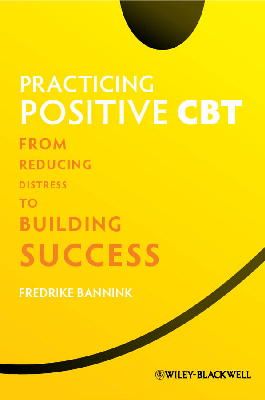
Stock image for illustration purposes only - book cover, edition or condition may vary.
Practicing Positive CBT: From Reducing Distress to Building Success
Fredrike Bannink
€ 48.40
FREE Delivery in Ireland
Description for Practicing Positive CBT: From Reducing Distress to Building Success
Paperback. Practicing Positive CBT: From Reducing Distress to Building Success reveals a new therapeutic approach that combines traditional CBT with Positive Psychology and Solution-Focused Brief Therapy. Num Pages: 320 pages, black & white tables. BIC Classification: JMAL; MMJT1. Category: (P) Professional & Vocational. Dimension: 230 x 154 x 15. Weight in Grams: 410.
Practicing Positive CBT: From Reducing Distress to Building Success reveals a new therapeutic approach that combines traditional CBT with Positive Psychology and Solution-Focused Brief Therapy.
By shifting the focus of therapy from what is wrong with clients to what it right with them and from what is not working to what is, Positive CBT creates a more optimistic process that empowers clients and therapists to flourish.
- Increases client motivation and collaboration; allows therapeutic outcomes to be achieved in shorter timeframes and in a more cost-effective way
- Covers theory and applications, and provides a wide range of stories, exercises and case studies
- The author has a uniquely broad knowledge and experience as a therapist and trainer of CBT, PP, and SFBT
Product Details
Publisher
John Wiley and Sons Ltd
Number of pages
320
Format
Paperback
Publication date
2012
Condition
New
Weight
409g
Number of Pages
320
Place of Publication
Hoboken, United Kingdom
ISBN
9781119952695
SKU
V9781119952695
Shipping Time
Usually ships in 7 to 11 working days
Ref
99-50
About Fredrike Bannink
Fredrike Bannink is a clinical psychologist and Master of Dispute Resolution based in Amsterdam. She is an internationally recognized cognitive behavioral therapist and trainer, and co-founder and Chair of the Solution-Focused CBT Section of the Dutch Association for Behavioural and Cognitive Therapy.
Reviews for Practicing Positive CBT: From Reducing Distress to Building Success
“It was a refreshing read and highlighted the need for clinicians to regularly review their approach and push for positive psychological wellbeing for their clients and themselves beyond distress reducction.” (Behavioural & Cognitive Psychotherapy, 1 June 2013)
